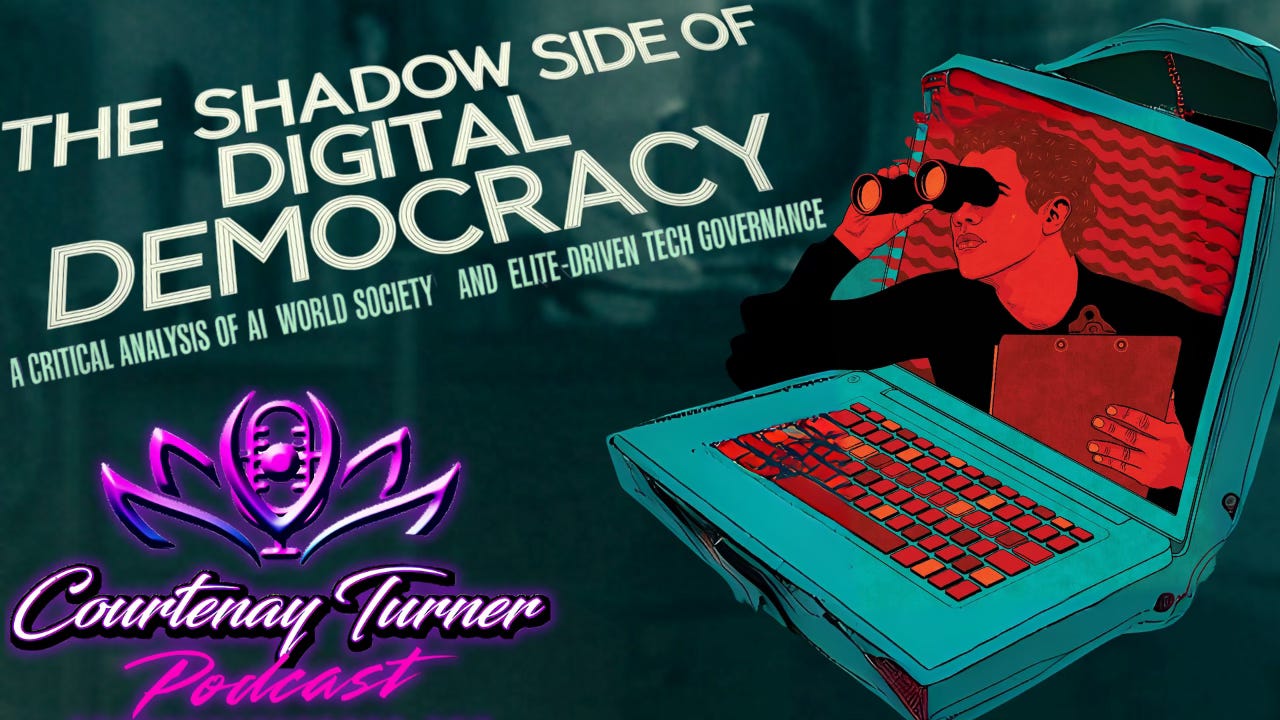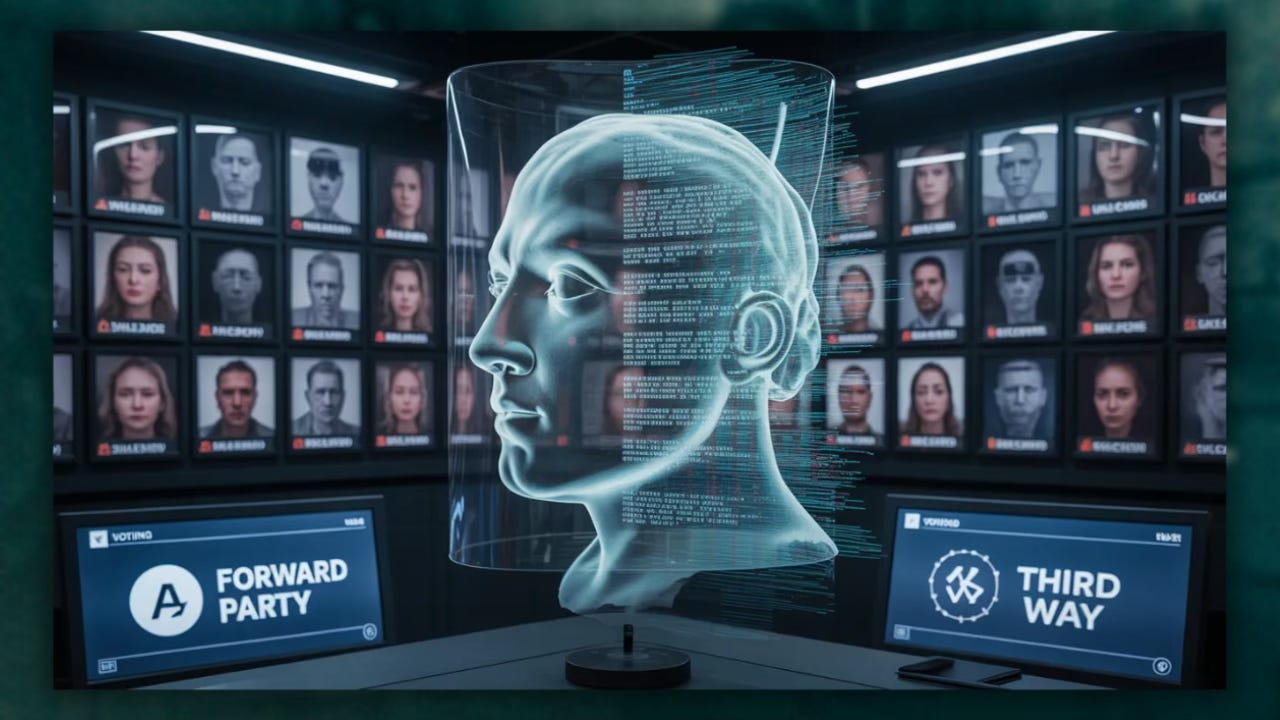The Shadow Side of Digital Democracy:
A Critical Analysis of AI World Society and Elite-Driven Tech Governance
TLDR:
The Bottom Line: What's marketed as "digital democracy" is actually a sophisticated power grab by tech elites, transforming genuine civic participation into managed participation theater while threatening cognitive liberty itself.
The Elite Capture Machine
The AI World Society (AIWS), led by former Massachusetts Governor Michael Dukakis and Vietnamese entrepreneur Nguyen Anh Tuan, exemplifies how "digital democracy" initiatives concentrate power among academic and political elites. Their latest venture—blockchain-certified "Esteemed Digital Assets"—literally tokenizes political legacies, creating artificial scarcity around historical narratives while an elite board of MIT and Harvard affiliates controls the curation.
Even more concerning is their "Music for Humanity" initiative, which uses "AI-amplified music" for what can only be described as emotional engineering—bearing striking similarities to the HeartMath Global Coherence Initiative's attempts at technologically-mediated consciousness manipulation.
Taiwan's "Success Story" Exposed
Taiwan's vTaiwan platform, celebrated globally as a digital democracy triumph, reveals the fundamental flaws in these systems when examined closely. The brutal reality: only 0.04% of Taiwan's population actually engaged with the platform, and legislators admitted they don't take it seriously because the government isn't required to adopt recommendations.
This isn't democratization—it's participation theater that serves educated, urban elites while excluding rural, elderly, and less tech-savvy citizens. The platform "hasn't been used for any major decisions since 2018," proving that ultimate power remains concentrated in traditional institutions.
Blockchain Voting: The Un-Constitutional Trojan Horse
MIT cybersecurity experts have issued devastating warnings against blockchain voting, demonstrating these systems create "undetectable, nation-scale election failures". Real-world pilots validate these concerns: West Virginia's blockchain voting was hacked within 72 hours, while Nevada's system allowed undetectable vote alterations.
Yet "Third Way" movements like Andrew Yang's Forward Party continue promoting blockchain voting as democratic innovation. This represents a deceptive advance toward technocratic governance that would replace constitutional accountability with unaccountable algorithms.
The Cognitive Liberty Threat
The convergence of AI, neuroscience, and ubiquitous computing creates unprecedented opportunities for surveillance and mental manipulation. AIWS's combination of AI-generated content, blockchain-certified narratives, and "AI-amplified music" represents a sophisticated approach to shaping public consciousness.
Chile recognized this threat by becoming the first country to enshrine neurorights in its constitution in 2021, prohibiting non-consensual neural data extraction and the buying/selling of brain data. Colorado followed with America's first neural data protection law in 2024.
The Academic Warning
Research consistently reveals that "the field of e-democracy has generally failed to live up to its own reformist rhetoric". A UC Berkeley study found that college graduates are 1.5 times more likely to blog, twice as likely to post content, and three times more likely to comment online compared to high school graduates. Less than 10% of the U.S. population participates in online content creation, making digital platforms "more of a playground for the affluent than a digital democracy."
The Pattern Revealed
The evolution from 2012's grassroots g0v movement to 2025's AIWS ecosystem reveals a clear trajectory: genuine civic tech innovations have been captured and transformed into elite-controlled systems that maintain the rhetoric of empowerment while concentrating decision-making power.
The Choice Before Us
These aren't innovations—they're digital feudalism disguised as democracy. The infrastructure being built would permanently replace "We the People" with "We the Algorithms," creating what critics call a "velvet-gloved architecture of control" where every click, vote, and potentially even brainwave feeds systems designed to shape behavior in ways both unseen and unaccountable.
The time for vigilance is now. Citizens must reject blockchain voting, expose elite networks funding these initiatives, and demand genuine cognitive liberty protections before this digital cage masquerading as liberation becomes inescapable.
The future of human agency hangs in the balance—and the tech elites are betting you won't notice until it's too late.
The Digital Democracy Deception
In an era where digital technologies increasingly shape democratic participation, a constellation of initiatives promises to revolutionize governance through artificial intelligence and blockchain technologies. At the center of this movement sits the AI World Society (AIWS), a Boston Global Forum initiative that advocates for “digital democracy” and “ethical AI governance. ”Beneath the progressive rhetoric of empowerment and transparency lies a more troubling reality: the concentration of power among tech elites and the potential erosion of genuine citizen agency.
This analysis examines the growing influence of AIWS and related digital democracy projects, revealing how buzzwords like “democratization”, “decentralization” and “empowerment” may mask concerning limitations that threaten personal sovereignty and cognitive liberty.
The AIWS Ecosystem: Tokenizing Leadership and Influence
Digital Assets as Narrative Control
The AI World Society’s latest venture into blockchain-certified “Esteemed Digital Assets” represents a concerning evolution in how political legacies are commodified and controlled. These non-fungible tokens (NFTs), managed through the AIWS Asset Board chaired by former Massachusetts Governor Michael Dukakis, digitize the legacies of global leaders like Finnish President Sauli Niinistö and Taiwan’s Audrey Tang— Taiwan’s Cyber Ambassador and a prominent figure in digital democracy and AI governance. She received the 2025 World Leader in AI World Society (AIWS) Award from the Boston Global Forum on April 22, 2025, at Harvard University’s Loeb House for her contributions to reshaping governance in the AI age. Tang, the world’s first nonbinary cabinet official, previously served as Taiwan’s Minister of Digital Affairs, where she pioneered initiatives like the g0v movement and vTaiwan platform to enhance transparency and citizen engagement through technology. Described as a “conservative anarchist,” she advocates for prosocial AI to foster constructive public discourse, emphasizing trust, transparency, and “plurality over polarization.” Her work, including co-authoring the book Plurality, promotes AI frameworks and collaborative governance models globally.
Launched on AIWS.city in November 2025, these tokens are marketed as preserving contributions to “peace, security, innovation, and ethical AI advancement”. However, the initiative raises fundamental questions about who controls historical narratives in the digital age. With only 10-20 tokens issued per honoree to maintain “exclusivity,” the platform creates artificial scarcity around political legacies while concentrating curation power among an elite board of MIT and Harvard affiliates.
The concerns extend beyond mere commercialization. As recent analysis of NFT markets reveals, such platforms are particularly vulnerable to fraud, scams, and market manipulation. The U.S. Treasury Department has identified significant risks in the NFT space, including over $100 million in theft through scams between July 2021 and July 2022. When applied to political legacies, these vulnerabilities take on additional dimensions of narrative control and historical manipulation.
The Music for Humanity Initiative: Emotional Engineering
Perhaps more concerning is AIWS’s venture into what they term “Music for Humanity,” launched in July 2025 as a “global movement that seeks to harness the power of music to inspire compassion, peace, and ethical leadership”. Co-founded by Governor Dukakis and BGF CEO Nguyen Anh Tuan, the initiative promises to use “AI-amplified music” to address the “ethical challenges and emotional impacts of rapid technological change”.
This approach bears striking similarities to the HeartMath Global Coherence Initiative (GCI), which uses biofeedback technology to allegedly align heart rhythms across users, claiming to create “collective consciousness shifts”. Research on HeartMath’s approach has shown mixed results, with some studies indicating trends toward both global and local group coherence, though the mechanisms remain unclear.
The parallel raises questions about the use of technology for emotional manipulation and behavioral modification. When powerful institutions combine AI with cultural production, the potential for subtle influence over public sentiment becomes significant.
Taiwan’s Digital Democracy: Model or Warning?
The g0v Movement: Grassroots Innovation or Elite Capture?
Taiwan’s g0v movement, often celebrated as a triumph of digital democracy, provides a crucial case study in how well-intentioned civic tech can evolve in unexpected directions. Founded in 2012 as a grassroots response to government opacity, g0v is purported to contribute significant improvements in government transparency and citizen engagement.
However, academic research reveals concerning limitations that mirror broader patterns in digital democracy initiatives. Studies show that platforms like vTaiwan, despite their “democratizing” rhetoric, predominantly serve young, educated, urban populations, effectively excluding rural, elderly, and less tech-savvy citizens. This digital divide undermines claims of universal empowerment and can exacerbate existing inequalities, while serving those in power.
vTaiwan: Participation Theater?
The vTaiwan platform, launched in 2014, exemplifies these concerns. It has facilitated citizen input on legislation affecting ride-sharing and online alcohol sales, but a 2023 analysis found that the platform “hasn’t been used for any major decisions since 2018,” with co-creator Jason Hsu noting that “legislators don’t take it seriously” because “the government is not mandated to adopt recommendations”.
This reveals a fundamental limitation: while citizens can participate in elaborate consultation processes, ultimate decision-making power remains concentrated in traditional institutions. The result is what critics term “participation theater” – extensive engagement processes that provide the appearance of democratic input while maintaining existing power structures.
Academic research supports these concerns. A comprehensive study of digital democracy initiatives found that “while digital technologies offer the potential for enhancing democratic participation, they also present challenges, such as spreading misinformation and unequal access to digital resources”. The study emphasized the need for critical examination of whether these platforms truly democratize governance or merely create new forms of exclusion.
Elite Governance in Democratic Clothing
The MIT-Harvard Axis
A recurring pattern emerges across AIWS initiatives: governance by elite academic and political figures from prestigious institutions. The AIWS Asset Board includes figures from MIT, Harvard, and high-level government positions. This concentration of influence among academic and political elites raises questions about whose vision of “ethical AI” and “digital democracy” is being implemented.
Research on AI governance consistently identifies this problem of elite capture. A 2024 study on global AI governance noted that “A lack of global-majority representation in global digital governance undermines democratic principles and leads to disillusionment”. The study found that “authoritarian actors with an interest in asserting state power over the internet seek to marginalize civil society and private-sector actors who advocate for an open and participatory digital ecosystem”.
Finland’s “Every Citizen an Innovator”: Innovation or Compliance?
AIWS prominently features Finland’s “Every Citizen an Innovator” concept, derived from former President Niinistö’s economic philosophy. While Finland’s innovation success is real, the extrapolation to global AI governance raises concerns about cultural and contextual specificity.
The concept assumes universal access to AI and digital tools, yet global digital divides remain stark. The UN notes that low-income countries lag significantly in AI adoption due to weak digital infrastructure. When elite-designed systems ignore these realities, they risk creating new forms of exclusion while maintaining the rhetoric of inclusion or perhaps they are designed to put the higher income countries that are historically les acquiescent, into a control grid. Perhaps this why the UN Global Digital Compact is working so diligently to ensure that digital technologies expand to technologically undeveloped countries, to expand the scope of that grid.
The Taiwan Model Goes Global: AI AGE and Election Integrity
Exporting Digital Authoritarianism?
Taiwan’s inclusion as a founding member of the Artificial Intelligence Advisory Group on Elections (AI AGE), launched by the International Foundation for Electoral Systems in June 2025, represents the globalization of Taiwan’s digital democracy model. While Taiwan’s experience countering disinformation is valuable, the global application of AI-driven election security tools raises significant concerns about surveillance and narrative control.
Taiwan’s MyGoPen fact-checking system, which handles thousands of claims daily, demonstrates both the potential and the risks of AI-assisted information verification. While effective against disinformation, such systems also create infrastructure for controlling information flows and defining truth. When exported globally, these tools could serve establishment interests rather than self-governing ones.
Research on digital privacy and democracy emphasizes these risks. As one analysis notes, “Digital privacy is necessary for democracy to thrive. As digital monitoring expands from online to offline spaces and eventually into our physical bodies, digital privacy has become fundamental to preserving our understanding of freedom, autonomy, and human dignity”.
The Broader Pattern: Digital Democracy as Elite Project
Academic Warnings
Scholarly research increasingly questions whether digital democracy initiatives serve their stated goals. A systematic review of nearly 500 studies found significant negative effects of digital media on political behavior, particularly “increasing populism and polarization and decreasing political trust” in established democracies.
The study noted that “What is potentially destabilizing in established democracies can be beneficial for emerging democracy and strengthen the opposition in authoritarian regimes”. This suggests that digital democracy tools may serve different functions depending on existing power structures – potentially reinforcing elite control in established democracies while challenging authoritarian regimes, as is historically seen “democracy” translates to “revolution” (serving power structures who often fund both sides, but that’s a topic for a different day).
The Failure of E-Democracy
Academic analysis suggests that “the field of e-democracy has generally failed to live up to its own reformist rhetoric”. Rather than reforming government, many digital democracy initiatives end up replicating offline power dynamics in digital spaces. This “digital limits of government” phenomenon reveals how technological innovation alone cannot address fundamental questions of power and representation.
A bibliometric analysis of digital democracy research found that studies predominantly focus on platforms like Twitter “despite it being an echo chamber representing only a small part of Indonesian society”. This methodological limitation mirrors the broader problem: digital democracy initiatives often serve the already connected and engaged rather than expanding participation.
Cognitive Liberty Under Threat
The Neuroscience of Influence
The convergence of AI, neuroscience, and media production creates unprecedented opportunities for subtle influence. AIWS’s combination of AI-generated films, blockchain-certified narratives, and “AI-amplified music” represents a sophisticated approach to shaping public consciousness.
Research on digital influence reveals how “AI systems increasingly shape outcomes in areas” beyond traditional media, affecting “environmental, social and ethical consequences” in ways that may “reinforce existing inequalities or create new ones”. When combined with the emotional manipulation potential of AI-enhanced media, these tools could significantly impact cognitive liberty.
The HeartMath Parallel
The similarities between AIWS’s Music for Humanity and the HeartMath Global Coherence Initiative, heavily promoted by Barbara Marx Hubbard are troubling. HeartMath’s approach to creating “global coherence” through synchronized biofeedback represents an early attempt at technologically mediated collective consciousness manipulation.
While research on HeartMath shows mixed results, the underlying premise – that technology can be used to influence human consciousness at scale – has evolved significantly with advances in AI and neuroscience. When applied by well-funded institutions with explicit political goals, such techniques raise fundamental questions about mental autonomy and cognitive liberty.
Resistance and Alternatives
Defending Cognitive Sovereignty
The defense of cognitive liberty requires vigilance about how digital democracy initiatives actually function versus how they are marketed. Key questions include:
• Who controls the algorithms that shape information flows?
• What data is collected and how is it used?
• Who benefits from the platforms’ operation?
• Are there meaningful alternatives for those who choose not to participate?
Research emphasizes the importance of “raising awareness about NFT rights and risks among consumers and investors” and promoting “responsible participation” in digital markets. The same principle applies to digital democracy: citizen education about the real functioning of these systems is essential for informed participation.
Digital Democracy Initiatives as Threats to Constitutional Governance
The proliferation of digital democracy platforms—championed by "post-partisan" “Third Way” movements like the Third Way think tank, Forward Party, The Emancipation Party, GoodParty.org, Renew America Movement (RAM), Serve America Movement (SAM),No Labels, United Independents, Alliance Party, Braver Angels, The People’s Party (U.S., historical context), Independent Voting, Common Sense American, We the People Party—poses a fundamental threat to the U.S. constitutional republic.
I cover more on this here:
These initiatives, while framed as innovative solutions to political polarization, risk dismantling core constitutional safeguards through three primary mechanisms:
1. Erosion of Representative Accountability
The U.S. constitutional system relies on elected representatives who are directly accountable to voters. Blockchain-based voting systems (e.g., those promoted by Andrew Yang's Forward Party) and AI-driven governance tools shift decision-making to unaccountable technical infrastructures. MIT researchers confirm that blockchain voting creates "undetectable, nation-scale election failures" by eliminating paper audit trails, making electoral fraud impossible to trace or remedy. This undermines Article I’s guarantee of representative governance, replacing it with opaque algorithms controlled by private entities.
2. Elite Capture Under "Post-Partisan" Frameworks
Third Way, political movements, such as the Forward Party advocate for "trans-political" collaboration, positioning themselves as alternatives to partisan gridlock. However, their policy agendas—particularly blockchain voting and AI-assisted governance—concentrate power among technocratic elites. For example:
Third Way coordinates with Democratic leadership to suppress third-party ballot access, leveraging legal threats and donor coercion.
The Forward Party’s blockchain advocacy aligns with AIWS’s model of "digital democracy," where platforms like AIWS.city tokenize political influence under boards chaired by figures like Michael Dukakis.
These structures replicate AIWS’s "House of Honor" model, where unelected boards (e.g., MIT/Harvard affiliates) arbitrate "valid" innovation or leadership, contradicting the Constitution’s separation of powers.
3. Vulnerability to Systemic Manipulation
Blockchain and AI systems advocated by these groups introduce critical vulnerabilities:
Microsoft’s Copilot already generates election misinformation in non-English languages, demonstrating how AI tools can manipulate democratic discourse.
Blockchain voting enables "silent and undetectable modification of votes" (U.S. Vote Foundation), as seen in West Virginia’s pilot where biometric verification failed to prevent hacking risks, but lays the groundwork for surveillance.
AIWS-style "digital assets" could commodify political speech, where NFT-based voting tokens (like AIWS’s "Esteemed Digital Assets") create scarcity-driven influence markets.
The "Third Way" Deception: Smuggling in Technocracy
These movements employ deceptive rhetoric to advance digital authoritarianism:
False Neutrality: The Forward Party claims to transcend ideology while partnering with blockchain firms that profit from voting data monetization. Third Way’s "moderate" branding masks its role as a Democratic Party-aligned entity suppressing electoral competition. In his book, The Third Way: The Renewal of Social Democracy, Anthony Giddens explicitly states “A renewed social democracy has to be left of centre, because social justice and emancipatory politics remain at its core.”
Exploiting Distrust: By framing traditional institutions as "broken," they position
Keep reading with a 7-day free trial
Subscribe to Courtenay’s Substack to keep reading this post and get 7 days of free access to the full post archives.













